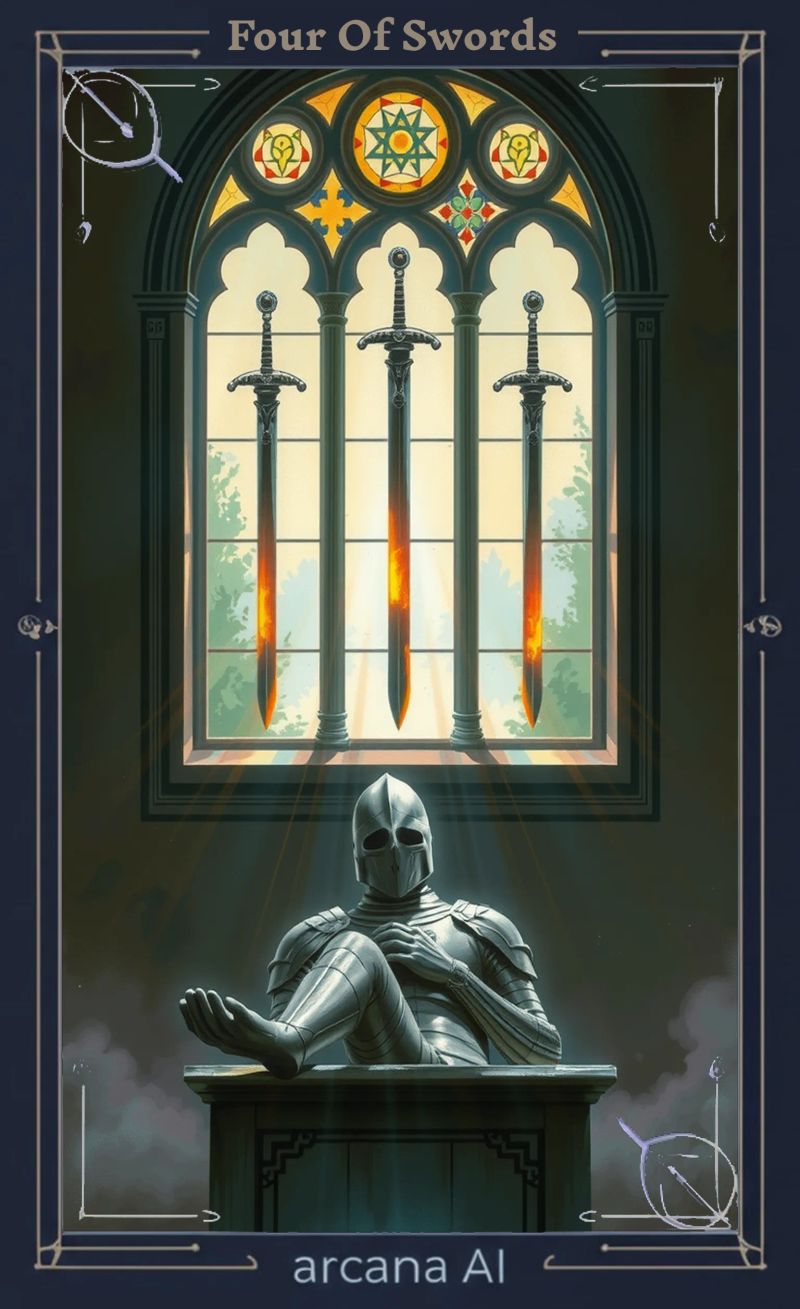Four of Swords
The Four of Swords represents the essential wisdom of strategic retreat and mental recuperation. This card acknowledges that true strength comes not just from constant activity, but from knowing when to pause, reflect, and restore one’s mental and spiritual resources. It reminds us that sometimes the bravest action is choosing to rest.
Position in the Deck
Minor Arcana - Card 4 of the suit of Swords, representing intellect, communication, conflict, and mental clarity. The Swords correspond to the element of Air and deal with mental matters, challenges, and truth-seeking.
Upright Meaning
The Four of Swords upright signifies rest, recuperation, meditation, and mental peace. This card appears when you need to take a break from mental stress, conflict, or overthinking. It represents a period of voluntary or necessary withdrawal for the purpose of healing and gaining perspective.
Practical Implications:
- Take time for rest and mental recuperation
- Create space for meditation or quiet contemplation
- Step back from stressful situations or conflicts
- Allow yourself to heal from mental exhaustion
- Practice mindfulness or peaceful reflection
- Consider a retreat or change of environment
- Focus on inner peace and spiritual renewal
Reversed Meaning
When reversed, the Four of Swords suggests forced rest, burnout recovery, resistance to help, or stagnation. You may be experiencing enforced downtime due to illness, exhaustion, or circumstances beyond your control. This position can indicate difficulty accepting help or resistance to necessary rest periods.
Challenges and Warnings:
- Don’t ignore signs of mental or physical exhaustion
- Be open to accepting help when it’s offered
- Consider if you’re pushing yourself too hard
- Address any resistance to rest or self-care
- Watch for burnout or breakdown symptoms
- Allow yourself to receive care from others
- Remember that rest is productive and necessary
Symbolic Elements
The Recumbent Figure: A person lies peacefully on what appears to be a tomb or altar, representing surrender to rest, meditation, and the temporary nature of life’s challenges.
The Stained Glass Window: A beautiful religious or spiritual window above the figure suggests divine protection, spiritual guidance, and the sacred nature of rest and healing.
The Three Swords on the Wall: Three swords hang on the wall, symbolizing conflicts or challenges that are temporarily set aside, while one sword remains below, suggesting that rest is a strategic choice rather than defeat.
The Single Sword Below: One sword lies beneath the figure, representing the mental tools and challenges that remain present even during rest, reminding us that recuperation is part of the ongoing journey.
Color Symbolism:
- Gray (stone): Stability, endurance, timeless wisdom
- Blue (window): Peace, spirituality, higher guidance
- Yellow/Gold (accents): Divine light, hope, renewal
- Red (details): Vitality, life force, passion for life
Historical Context
The Four of Swords draws from contemplative and healing traditions:
- Monastic Retreat: Medieval traditions of spiritual retreat and contemplation
- Healing Sanctuaries: Ancient places of rest and recuperation
- Meditation Practices: Eastern and Western traditions of mindfulness and mental rest
- Convalescence: Recognition of the healing power of rest and peace
Card Interactions
With The Hermit: Amplifies themes of withdrawal for spiritual growth With The High Priestess: Suggests deep inner wisdom through quiet contemplation With The Chariot: Represents strategic pauses in the midst of ambition With The Tower: May indicate that rest follows upheaval or crisis
Elemental and Astrological Correspondences
Element: Air (mental clarity, communication, intellect, peace of mind) Astrological Sign: Libra (balance, harmony, peaceful resolution) Planet: Venus in Libra (peaceful rest, balanced recovery, harmonious healing) Associated Energies: Rest, recuperation, meditation, mental peace, strategic retreat
Esoteric Meanings
In occult traditions, the Four of Swords represents:
- The alchemical principle that rest is necessary for transformation
- The understanding that mental peace precedes clear action
- The spiritual recognition that withdrawal can be a form of strength
- The balance between engagement with the world and inner retreat
- The transformative power of meditation and contemplation
